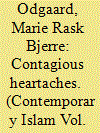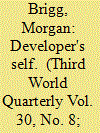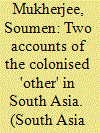| Srl | Item |
| 1 |
ID:
180001


|
|
|
|
|
| Summary/Abstract |
This article studies the relationship between care, family connectivity and queer selfhood in a Muslim-majority context. Based on fieldwork in Amman, Jordan, the article explores how queer people find themselves in demanding circumstances figuring out how to care for—and be responsible to—their family members, whilst caring for themselves at the same time. Drawing partly on Suad Joseph’s patriarchal connectivity and Lotte Meinert and Lone Grøn’s contagious kinship connections, I argue that if we are to understand queer selfhood in Jordanian and other Arab, Muslim-majority contexts in more nuance, we need to look at the relations and emotions at stake in care. Through selected ethnographic cases—in particular one that deals with heartaches—we take a closer look at how queer selfhood is constituted in response to, and up against care and control dynamics in the family. This exposes the interrelated and emotionally contagious qualities of kinship, sexuality and gender. It moves us beyond an understanding of queer subjectivities at the margins of a Muslim community, and towards an understanding of what care and queer selfhood in Muslim and Arab contexts also involves becoming through the hands and hearts of others.
|
|
|
|
|
|
|
|
|
|
|
|
|
|
|
|
| 2 |
ID:
092921


|
|
|
|
|
| Publication |
2009.
|
| Summary/Abstract |
Recent development studies literature has begun to consider the developer's self. This welcome enlargement of the field deserves to be deepened and extended by moving beyond opposition to post-development critics, and by articulating an explicit theoretical frame for examining developers' selves. By exploring Foucault's suggestion that modern approaches to knowledge and selfhood may be entwined through developmentalism, this paper proposes a flexible and non-deterministic cultural-historical framework for considering developers' selves. Foucault's analyses of relations of power and subjectivity provide strategies for examining developers' selves, but this does not suggest that such selves can be read off the proposed framework. Examining developers' selves is necessarily a reflective ethical task, and one which requires engaging the external relations that constitute the self. Foucault provides valuable resources for this task, but there is also a need to extend upon and complement a Foucauldian approach. Pursuing our new-found interest in developers' selves by working through and beyond Foucault promises to open new professional futures and possibilities for development practice.
|
|
|
|
|
|
|
|
|
|
|
|
|
|
|
|
| 3 |
ID:
097727


|
|
|
|
|
| Publication |
2010.
|
| Summary/Abstract |
Taking examples from South Asia, this article shows how British colonial knowledge about the non-European 'other' hinged substantially on the participation of sections of that other, especially in the context of liminal groups, for whom no ready standardised formula of identification was available. Development of a colonial episteme often involved active intervention from the colonised body, thereby dispelling any strict notion of coloniser-colonised alterity and mere top-down governance. This process of identity construction took place in several arenas and also involved negotiations in courts of law, where rival sections of the amorphous colonised body fought for competing ideals of selfhood. Complementing this legal construction were ethnographic formulations, internally diverse, and often relating to broader politico-intellectual concerns and debates of the Empire, at different planes in different ways. The article explicates their theoretical bases and practical modalities.
|
|
|
|
|
|
|
|
|
|
|
|
|
|
|
|